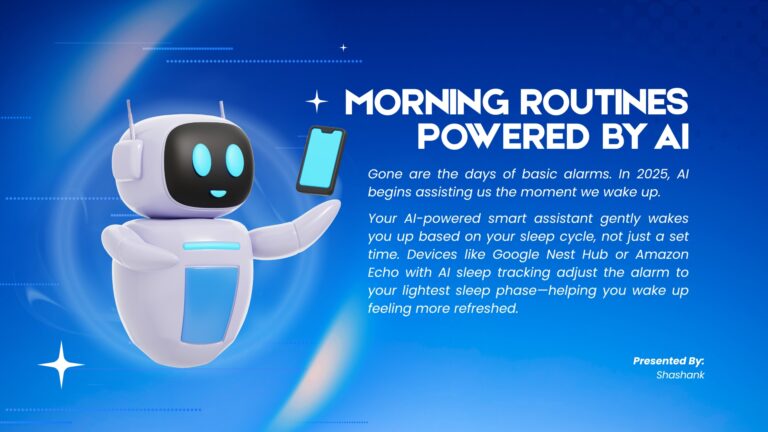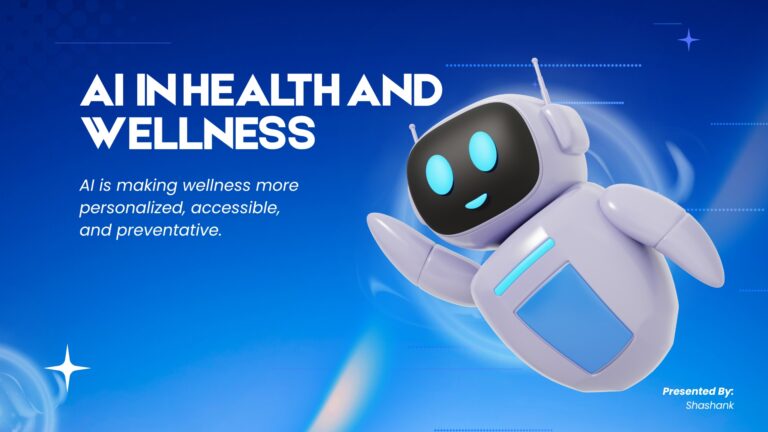How AI is Shaping Our Daily Lifestyle in 2025: The Future is Now

In just a few years, artificial intelligence (AI) has moved from science fiction to the center of our everyday lives. Once viewed as a futuristic concept, AI is now influencing how we live, work, learn, shop, and even care for our health. In 2025, the integration of AI into daily routines isn’t just a trend—it’s a lifestyle transformation.
From smart assistants that manage your day to personalized health trackers and AI-powered content recommendations, the ways AI supports us are growing at a rapid pace. Let’s dive into how AI is shaping our daily lifestyle in 2025 and what it means for the way we navigate the world.
Morning Routines Powered by AI
Gone are the days of basic alarms. In 2025, AI begins assisting us the moment we wake up.
Smart Wake-Up

Your AI-powered smart assistant gently wakes you up based on your sleep cycle, not just a set time. Devices like Google Nest Hub or Amazon Echo with AI sleep tracking adjust the alarm to your lightest sleep phase—helping you wake up feeling more refreshed.
Personalized Daily Briefing
As you sip your morning coffee, your smart assistant gives you a tailored briefing: weather, calendar appointments, news updates, and even reminders about upcoming birthdays or tasks.
AI in Health and Wellness
AI is making wellness more personalized, accessible, and preventative.

Virtual Health Coaches
Wearables like the Apple Watch Series 10 or Fitbit Sense 3 now include AI that not only tracks your heart rate, sleep, and steps but interprets the data in real-time. It provides health alerts, stress-reducing exercises, and even meal suggestions based on your daily activity and biometrics.
Telehealth and Virtual Doctors
AI chatbots in healthcare apps now triage symptoms and connect users with medical professionals when needed. You can describe your symptoms, and the AI provides preliminary diagnostics before routing you to a human expert.
Mental Health Support
Apps like Woebot or Wysa use AI-driven conversations to provide emotional support, CBT (Cognitive Behavioral Therapy) techniques, and mindfulness reminders—all available 24/7.
Smarter Workdays with AI Assistance
AI isn’t replacing jobs—it’s enhancing how we work.
Virtual Assistants & Productivity
AI-powered tools like Microsoft Copilot and Notion AI now summarize meetings, draft emails, and suggest action points, helping professionals stay productive with less effort.
AI in Remote Work
Virtual offices powered by AI match your work habits to the best schedules, suggest breaks to prevent burnout, and even adjust your video conferencing lighting or background automatically.
Content Creation
Whether you’re a marketer, blogger, or designer, AI tools like ChatGPT, Jasper, and Canva Magic Studio now help brainstorm ideas, write engaging copy, and create visual content faster than ever.
AI in Smart Homes
Our homes are now co-piloted by AI systems that improve comfort, security, and efficiency.

Intelligent Appliances
Fridges suggest meals based on what’s inside and your dietary goals. Smart ovens adjust cooking temperatures automatically. Washing machines recommend the best cycles using fabric detection AI.
Energy Efficiency
AI-powered thermostats like Nest or Ecobee learn your schedule and weather patterns to optimize energy use—cutting both your carbon footprint and bills.
Home Security
AI cameras and motion sensors use facial recognition and behavior analysis to differentiate between a family member, a stranger, or even a pet. You get instant alerts, and some systems can even contact authorities autonomously in case of emergency.
Personalized Shopping Experiences
AI has completely changed how we shop in 2025, from browsing to checkout.
Virtual Try-Ons & Smart Mirrors
Thanks to augmented reality and AI, shoppers can try on clothes, makeup, or glasses virtually through apps or in-store smart mirrors—tailored to their skin tone, size, and preferences.
AI Shopping Assistants
Chatbots help you find what you’re looking for, compare prices, and even track delivery in real-time. On platforms like Amazon, AI curates product suggestions based on past purchases and current needs.
Predictive Subscriptions
Grocery apps now auto-schedule deliveries based on your consumption habits. AI predicts when you’ll run out of milk or coffee and reorders before you even notice.
AI and Transportation
AI has revolutionized how we move through cities and across countries.
Smart Navigation
Navigation apps like Google Maps and Waze now use real-time AI to predict traffic patterns, suggest alternate routes, and even recommend the best time to leave based on weather, traffic, and events.
Autonomous Vehicles
While full self-driving cars aren’t yet universal, assisted driving features powered by AI are now standard in many cars. These include lane-keeping, adaptive cruise control, and accident prevention systems.
AI in Public Transport
City buses and trains are equipped with AI that optimizes schedules, reduces delays, and improves route planning. AI ticketing systems detect demand surges and adjust pricing or services accordingly.
AI in Entertainment and Leisure (the time when you do not have to work; free time)
Whether you’re relaxing with a movie or discovering new music, AI is your personal curator.
Streaming Services
Netflix, Spotify, and YouTube use AI to recommend shows, songs, and videos that match your preferences, even adapting suggestions based on your mood or recent habits.
Personalized Gaming
AI-driven NPCs (non-playable characters) in games now react more realistically, making gaming experiences more immersive and dynamic. Some games also adapt difficulty levels in real-time based on your performance.
Creative Collaborations
AI music generators, poetry writers, and design tools allow everyday users to create art, music, or short stories—even if they’ve never had training. Apps like DALL·E or Suno let you co-create with AI for fun and inspiration.
Learning & Education Enhanced by AI
AI has personalized education, making learning more adaptive and accessible.
Smart Learning Platforms
Apps like Duolingo, Coursera, and Khan Academy use AI to adapt lessons based on your learning pace, knowledge gaps, and even learning style—making it easier to grasp complex topics.
Virtual Tutors
AI tutors offer explanations, answer questions, and provide instant feedback. These systems allow students to learn anytime, without depending solely on human educators.
Classroom Assistance
In schools and colleges, AI supports teachers by automating grading, generating personalized learning paths, and identifying students who may need extra help.
AI for Daily Decision-Making
Need help planning a vacation, finding a recipe, or deciding what to watch? AI has become your life advisor.

Personal AI Agents
Digital assistants like Siri, Alexa, and Google Assistant now act as life managers—helping you plan trips, set reminders, and manage finances with a conversation.
Decision Support Tools
From helping you choose the right insurance plan to offering financial advice, AI tools assess risks, compare options, and offer suggestions based on your goals.
Final Thoughts: Living with AI, Not Just Using It
As AI becomes more integrated into our everyday lives, it’s not just a tool—it’s a partner. In 2025, AI enhances productivity, boosts well-being, and simplifies decision-making across nearly every aspect of life.
However, it also raises important questions: How do we balance convenience with privacy? How do we stay human in a machine-assisted world? These are conversations we must continue to have as we embrace AI’s growing role in society.
But one thing is clear: AI isn’t the future—it’s the present. And the more we understand and mindfully use it, the more empowered we become in our digital lifestyle.
Frequently Asked Questions
AI now plays a role in nearly every aspect of our lives—from waking us up with personalized alarms to suggesting meals based on our health goals. AI systems in smart homes manage lighting, temperature, security, and even grocery shopping.
Smart assistants like Alexa 2.0, Google Nest AI, and Samsung SmartThings have become more advanced, integrating emotion recognition, personalized routines, and voice learning. AI-powered wearables now offer real-time health tracking and suggestions.
AI-driven fitness apps and wearables monitor vitals, analyze sleep, and suggest workouts based on your activity and energy levels. Some even offer mental wellness support through mood analysis and mindfulness coaching.